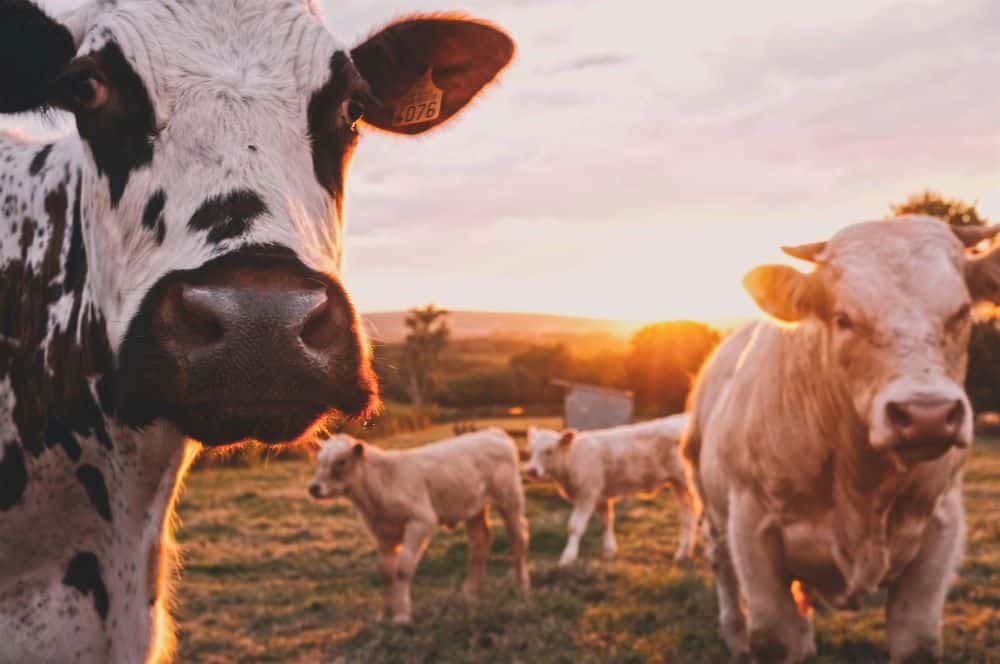World-class speakers on global food systems, climate and biodiversity are attending the “Extinction or Regeneration” Conference in London, organised by Compassion in World Farming. The programme is shown below.
Dame Jane Goodall DBE, founder of the Jane Goodall Institute and UN Messenger of Peace; Philip Lymbery, Global Chief Executive of Compassion in World Farming International; Vandana Shiva, eco-activist and founder of Navdanya: Compassion – the foundation of regenerative farming; and many other headliners are discussing this year’s conference themes:
Agriculture accounts for almost ½ of the usable land surface of the planet. Food production is the primary cause of biodiversity loss globally, and the global food system is responsible for more greenhouse gas emission than any other aspect of our lives.
Presentations and panel discussions focus on the development and implementation of key needs. These include the transformation of food systems; soil health; oceanic and agroecological food production; animal welfare and future pandemics; animal sentience; and science innovations to provide healthy diets for a planetary population that will soon reach 10 billion people.
Tickets can still be purchased on-line and live streaming is also available: www.https://www.extinctionconference.com/ Tickets will also be available on the door.
All of the speakers are scheduled to present live from the conference, with the exception of Raj Patel who cannot attend due to last minute demands in Texas.
PROGRAMME
Plenary session 1 – The impact of the global food system on human, animal and planetary health
- 09:05-11:00
World renowned speakers will set the scene on the existential threats to people and to life on earth posed by the way we farm and eat, and the need for a radical transformation of food systems – and the alternatives within reach.
- Chair: Joy Carter, Trustee of Compassion in World Farming International and former Vice-Chancellor, University of Winchester
- Jane Goodall, Founder – the Jane Goodall Institute & UN Messenger of Peace: (film)
- Philip Lymbery, Global Chief Executive, Compassion in World Farming International: Why animal welfare is key to solving the climate and nature crises.
- Olivier De Schutter, co-Chair of IPES-Food and UN Special Rapporteur on extreme poverty and human rights: Power and poverty in a crisis-prone food system.
- Tim Benton, Research Director at Chatham House in Energy, Environment and Resources; Research Professor at University of Leeds. Food systems futures and how to achieve them.
- Stefanos Fotiou, Head of the UN Food Systems Coordination Hub, Food and Agriculture Organization of the United Nations (FAO): Accelerating the SDGs: the opportunity of food systems transformation.
- Vandana Shiva, scholar, activist, and founder of Navdanya: Compassion – the foundation of regenerative farming.
- Melissa Leach, Director of the Institute of Development Studies (IDS): Preventing and preparing for pandemics: why food systems must transform.
Plenary session 2 – Soils, seas and sentient beings
11:30-13:15
Churchill Room
Biodiversity, soils, oceans, and the lives of animals, wild and farmed, are being adversely impacted by global food systems – but it doesn’t have to be this way. What happens if we put the wellbeing of animals and the planet at the centre of our food system design?
Chair: Reineke Hameleers, CEO, Eurogroup for Animals
Speakers in this session are:
· Rattan Lal, Distinguished University Professor of Soil Science, The Ohio State University: Managing soils of agroecosystems for climate and food security.
· Jennifer Jacquet, Associate Professor of Environmental Studies, New York University: Fish and aquatic invertebrates are not natural resources.
· John Webster, Professor Emeritus, University of Bristol: Sentient minds: Darwin, Humpty-Dumpty and the Buddha.
· Fritha Langford, Animal Welfare Scientist and Senior Lecturer, Newcastle University: Not just lawnmowers – the welfare of animals on regenerative farms.
· Carl Safina, Author and Ecologist: Culture in other sentient beings.
· Lyla June, Indigenous Musician and Scholar: Architects of abundance – Indigenous regenerative food systems and the excavation of hidden history.
Parallel Session A: Tackling power and politics
14:15-15:30
Churchill Room
Tackling power and politics: Aligning food systems with planetary, human, and animal health targets
This interactive session will discuss how we can align the production and consumption of animal-sourced foods with climate targets and biodiversity goals by 2030. How can we shift to regenerative, agroecological food systems that provide food security whilst significantly reducing consumption of animal-sourced foods? What are the roadblocks and the opportunities ahead?
Moderator: Mark Driscoll, Founder and Director, Tasting the Future
Speakers in this session are:
- Helen Harwatt, Senior Research Fellow in the Environment and Society Programme, Chatham House
- André Leu, International Director, Regeneration International
- Philip Lymbery, Global Chief Executive, Compassion in World Farming International
- Olivier de Schutter, Co-Chair of IPES-Food, UN Special Rapporteur on Extreme Poverty and Human Rights
- Vandana Shiva, Activist, Academic and Campaigner.
Parallel Session B: Regenerative farming and agroecology – the future of farming?
14:15-15:30
St. James
There’s a lot of buzz about regenerative farming and agroecology. But are they just buzzwords? Are they really the answer to the damage done by chemical-based factory farming to wildlife, ecosystems and the climate? Can they feasibly feed the world? And what would it take to transition our food and farming? Speakers will contrast their perspectives from around the world, and explain why they think farming with nature, enriching soils, allowing biodiversity to flourish and promoting the welfare of farmed animals is the future of food and farming.
Moderator: Nick Jacobs, Director, IPES-Food
Speakers in this session are:
· David Finlay, farmer, The Ethical Dairy
· Fritha Langford, Animal Welfare Scientist and Senior Lecturer, Newcastle University
· Seth Watkins, farmer and former UN Food Systems Champion.
· Nettie Wiebe, farmer and Professor Emerita, St Andrew’s College University Saskatchewan
Location: St James
Parallel Session C: Achieving food justice
14:15-15:30
Westminster
From production to consumption, injustice and power imbalances taint every link along the food supply chain. While a privileged few may enjoy sustainable lifestyles and healthy diets, no food system is sustainable when people cannot eat. Drawing on examples from South Africa, Brazil, the UK, USA, and beyond, this session looks at the multiple intersecting ways in which injustices and power imbalances plague food systems, and what is needed to achieve greater equity and justice.
Moderator: Nicole Pita, Project Manager, IPES-Food
Speakers in this session are:
· Stephen Devereux, Development Economist, Institute of Development Studies (IDS)
· Stef Lake, Community Development & Health Programme Manager, Sussex Community Development Association
· Dee Woods, Director, Landworkers Alliance
· Shalmali Guttal, Executive Director, Focus on the Global South
Location: Westminster
Plenary session 3 – Routes to transformation – Regenerating food systems in policy and practice
16:00-18:00
Churchill Room
Policy-makers and practitioners dialogue on how to transform food systems from above and from below, what agroecological and regenerative food systems have to offer, and how to make change happen.
Chair Nick Jacobs, Director, IPES-Food’s Secretariat
Speakers in this session are:
- Molly Anderson, Professor of Food Studies, Middlebury College: What is needed for transformation?
- Thomas Legrand, Lead Technical Advisor, UNDP: Inner capacities for regenerative food systems.
- André Leu, International Director, Regeneration International: Paying farmers for ecosystem services as an incentive for change
- Pierre-Marie Aubert, Director, Food and Agriculture Policies, IDDRI: Towards an agroecological Europe: economic challenges and policy levers.
- Seth Watkins, Farmer, Pinhook Farmer, Former UN Food Systems Champion: Achieving a peaceful and verdant future.
- Susan Chomba, Director of Vital Landscapes, World Resources Institute (WRI): Regenerative farming and Biodiversity in Africa.
- Ruud Zanders, Founding Partner, Kipster: Providing solutions to the farming crisis in The Netherlands.
- Reginaldo Haslett-Marroquin, Co-Founder and CEO, Tree Range® Farms, Founder and Board Chair: Tree range chicken farming.
- Susan Chomba, Director, Viable Landscapes for Africa, World Resources Institute
Location: Churchill Room
FRIDAY 12th MAY
Plenary session 4 – Role of business and investments in the sustainable food system of the future
09:00-11:00
Churchill Room
Shifting businesses, finance, and subsidies away from industrial food and livestock production to the sustainable food systems we need is critical. What investments are needed to scale out regenerative, agroecological food, from where? What’s the potential for alternative proteins and new technologies?
Chair: Tracey Jones, Director of Food Business, Compassion in World Farming
Speakers in this session are:
Jennifer Clapp, Professor and Canada Research Chair in Global Food Security and Sustainability, University of Waterloo: Countering corporate concentration and financialization in food systems.
Martin Palmer, Chief Executive, FaithInvest: Faith-consistent investing for a compassionate world.
Erika Susanto, Director of ESG and Research, FAIRR: Can the global financial system help accelerate a shift towards a sustainable food system?
Henry Dimbleby, Co-Founder of Leon Restaurants and the Sustainable Restaurant Association: Putting sentience into food policy.
James Bailey, Executive Director, Waitrose: Food as the Problem, Food as the Solution.
Rachel Eyre, Sustainable Procurement Manager, Compass Group: How plant-forward menus mean a triple-win for business.
Rune-Christoffer Dragsdahl, General Secretary, Danish Vegetarian Society (Dansk Vegetarisk Forening): How to achieve national plant-based policies – the case for Denmark.
Parallel Session D: Money talks – Investing in food and farming for the future
11:30-12:45
Churchill Room
Industrial agriculture could not exist without significant funding and subsidies. At the same time agro-ecological and regenerative projects are starved of funds. How do we shift finance towards a system that is better for human, animal and planetary health, and away from environmental and social harm? What role do governments, investors, banks, and standards play in achieving a sustainable economy? In this session we’ll hear more from speakers from a variety of perspectives, and the audience, to identify the most fruitful avenues for action.
Moderator: Martin Palmer, Chief Executive, FaithInvest
Speakers in this session are:
- Jennifer Clapp, Professor and Canada Research Chair in Global Food Security and Sustainability, University of Waterloo
- Bina Agarwal, Professor of Development Economics and Environment, University of Manchester
- Peter Elwin, Head of Food and Land Use, Planet Tracker
- Glenn Hurowitz, Founder and CEO, Mighty Earth
- Peter Stevenson, Chief Policy Advisor, Compassion in World Farming
- Rachel Harris, Director, Environmental & Social Risk Management, Standard Chartered
Location: Churchill
Parallel Session E: The future for aquatic foods
11:30-12:45
St. James
With aquaculture growing exponentially, we shall discuss the ethical and practical questions arising from this development. The intensification of aquaculture is posing a serious threat to the environment. Aquatic animal welfare is usually missing in debates about sustainable food production and ocean conservation. Panellists will discuss what policy changes are needed to shift aquaculture towards contributing positively to food production and how to ensure that the welfare of aquatic animals is not compromised and is properly addressed. Questions for discussion at the session could include:
Should we be farming carnivorous fish? How many fishes are used to feed one farmed salmon? Is intensive fish farming too dependent on chemicals such as fungicides? Is there a solution to the pollution caused by fish farms? Can fishes be slaughtered humanely? If so, how? If fishes are sentient beings, should we be eating them at all? Are there other aquatic foods that may be better for the environment and for us than fish?
Moderator: Debbie Tripley, Global Director of Campaigns and Policy Advocacy, Compassion in World Farming
Speakers in this session are:
- Jennifer Jacquet, Associate Professor of Environmental Studies, New York University
- João Saraiva, Leader of the Fish Ethology and Welfare Group, Centre of Marine Sciences, Faro, and President and Founder of the FishEthoGroup Association
- Christine Xu, Head of Strategic Initiatives, Aquatic Life Institute
- Krzysztof Wojtas, Head of Fish Policy, Compassion in World Farming International
- Andrés Jiménez Zorrilla, CEO, Shrimp Welfare Project
Parallel Session F: Recipes for success – weaving a movement ecosystem across Europe
11:30-12:45
Westminster
Transitioning to healthy, just and sustainable diets requires deep collaboration between all stakeholders in and across local, regional, national and international food webs. But how is that done in practice, especially when the stakes are so high and the interests so different? In this conversation we will build on Recipes for Success, hearing from Poland, Spain, Italy and beyond how a movement eco-system is slowly but surely emerging to drive essential change.
Moderator: Idman Abdurahaman, Community Mobiliser, Eating Better
Speakers in this session are:
· Moderator: Idman Abdurahaman, Community Mobiliser, Eating Better
· Morgan Janowicz, Green Rev Institute, Coordinator of Future Food 4 Climate Coalition (Poland)
· David Sanchez, Confederation of Consumers and Users and affiliated with Plataforma Rural (Spain)
· Matteo Barbato, Fondazione Cariplo, Funder of Agroecology Projects in Northern Italy (Italy)
· Giulia Laganà, Fund manager and Co-Lead, Healthy Food Healthy Planet
Location: Westminster
Plenary session 5 – Transforming our health and diets
13:45-15:30
Churchill Room
Good food is a cornerstone of good health. Yet from food insecurity to chronic diseases, pollution to pandemic risks, our food system is profoundly undermining the health of humans, animals and the planet. How can we achieve dietary shift? How should national and local government and businesses support this shift?
Chair: Joyce D’Silva, Ambassador Emeritus, Compassion in World Farming
Speakers in this session are:
· Corinna Hawkes, Director, Food Systems and Food Safety Division – Food and Agriculture Organization, United Nations (FAO): Redesigning food systems for diet and health: a people-centred approach.
· Cóilín Nunan, Scientific Adviser, The Alliance to Save our Antibiotics: Intensive farming and the antibiotic-resistance crisis.
· Shireen Kassam, Consultant Haematologist, Honorary Senior Lecturer at King’s College Hospital, London: Eating plant-based for better health.
· Marco Springmann, Professor in Climate Change, Food Systems and Health, London School of Hygiene and Tropical Medicine: Healthy, planet-friendly diets and national dietary guidelines.
· Isha Datar, Executive Director, New Harvest: Cellular agriculture – diversifying our food system.
· Raj Patel, Writer, Activist and Academic (virtual): What’s stopping us from eating better?





